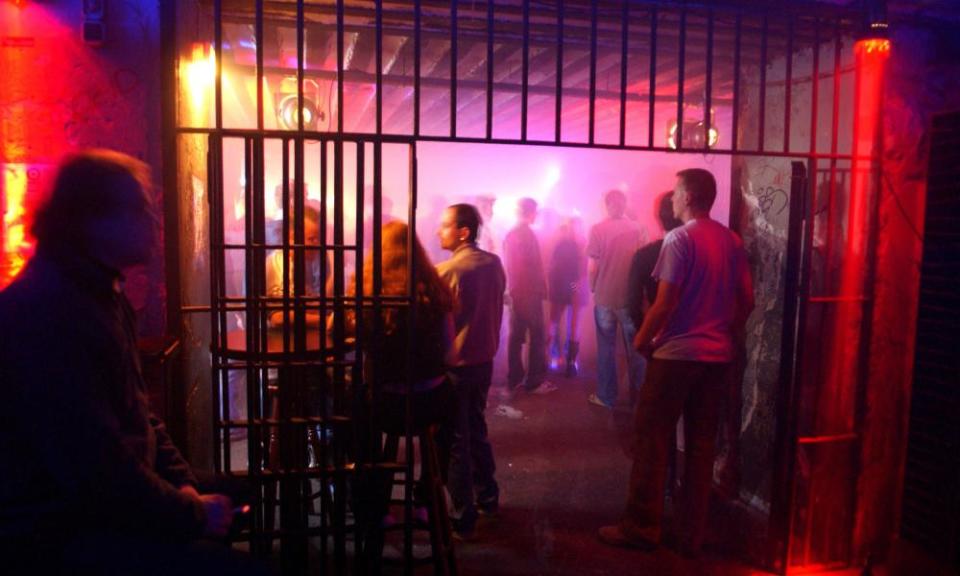Beat that: Berlin’s techno DJs seek Unesco world heritage status
Getting into Berlin’s famous Berghain nightclub is a formidable task, even for some of the world’s best-known DJs. So they are unfazed by the challenge of persuading Unesco to grant heritage status to Berlin techno.
The artists behind the Love Parade festival, DJs who pioneered the genre, and the impresarios of the German capital’s biggest clubs believe the backing of the UN body is vital for securing the future of the countercultural music genre.
Techno’s pounding mechanical beats emerged in Detroit in the mid-1980s, and when the Berlin Wall fell, Berliners adopted the genre as the perfect soundtrack to reunification. The abandoned bunkers, power plants and factories in the east of the city swarmed with clubbers from both sides celebrating their freedom.
Yet Covid and gentrification both threaten the survival of the “free, wild, creative Berlin,” according to Alan Oldham, the Detroit DJ who was part of the Underground Resistance collective and now lives in Berlin.
“Unesco protection would go a long way towards maintaining that old spirit,” he told the Observer. “Legacy venues like Tresor and Berghain for example would be protected as cultural landmarks.
“So many venues have closed in just the seven years I’ve lived here full time. In other cities, it would be the natural club cycle at work, but Berlin is a different kind of place, where the club and creative scenes are the currency of the city.”
Oldham, whose 1980s radio show gave techno its first platform, is one of those backing the campaign by Rave the Planet, a group formed by Matthias Roeingh, better known as Dr Motte, the DJ who founded Love Parade. They are lobbying German authorities to apply for Unesco’s intangible cultural heritage (ICH) status for Berlin techno.

ICH is more commonly granted to more obscure activities, such as Malawian Mwinoghe dancing or Slovakian bagpipe culture, but Jamaican reggae and India’s huge Kumbh Mela festival have been recognised, and Amsterdam’s Pride festival has been backed by the Dutch government. Recognising techno would open up access to government subsidies and other funding sources, and clubs would gain extra protection under town planning laws.
“Unesco protection would help a lot towards establishing techno and club culture as a legitimate social force with historical value and worthy of government support, not just hedonistic, disposable club music and drugs,” Oldham said. “Eventually, my hometown Detroit could maybe also benefit.”
Dimitri Hegemann, who founded Tresor – “the vault” – below a former department store in east Berlin, is another supporter. “After the fall of the Berlin Wall, techno transformed the city of Berlin,” he said. “East kids liked it, west kids liked it and they were bound together by it. It was a chance to try to something new, like after the second world war in Paris when Miles Davis came with cool jazz.
“In 1989, 1990, people in the east countries, like Poland, they came to Tresor, and they didn’t speak English. This new generation of Detroit techno, Underground Resistance and so on, had no words. There were no stupid messages. It was just music we could dance to.”
Related: ‘No established disco would have played this music’: 30 years of legendary Berlin club Tresor
Techno is still part of the fabric of the city, according to Peter Kirn, a Berlin-based DJ and music producer . “You literally can hear this music thumping from all corners. It’s really just everywhere,” he said. “In other cities, people wouldn’t accept music that’s really hard or weird and full of synthesisers and really brutal, distorted drum machines. You can’t play that at peak hour in a club, let alone over lunch. And here it’s totally acceptable to play that over lunch.”
He was initially sceptical about the Unesco bid, but has reconsidered. “I realised that it’s just like with any folk music – there’s always this kind of this clash between the sort of traditional and the experimental. The tension between those two things drives it forward.”
Black Detroit artists such as Oldham and Juan Atkins were moving to Berlin because it offered better support than the US, both in terms of arts funding and matters such as health care, Kirn said. It is also the centre of electronic music, the home of Ableton and Native Instruments, which make the software and instruments behind most modern beats.
“Techno has become a refuge for people who are marginalised and there’s a natural attraction to Berlin as a place which is more permissive, when you come from places that are less permissive,” Kirn said.
“Berlin is on this fracture line between western Europe and eastern Europe. And even though a lot of the focus is on what that meant in the 90s, when the wall came down, there’s been less focus on what’s happening now – Georgia is in crisis, Poland is in crisis, Russia is in crisis. So people from all those places are looking to Berlin as a hub for some kind of radical social response.”

 Yahoo Finance
Yahoo Finance 